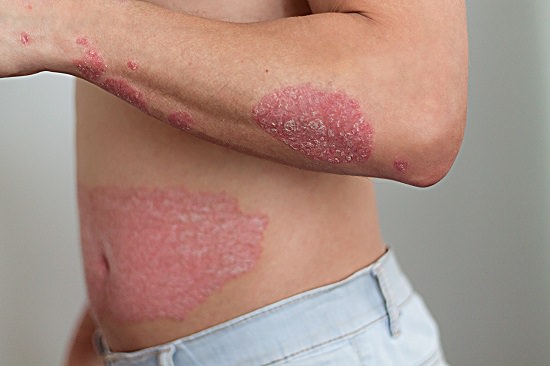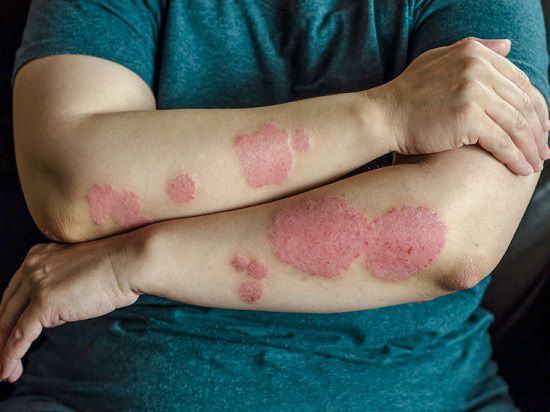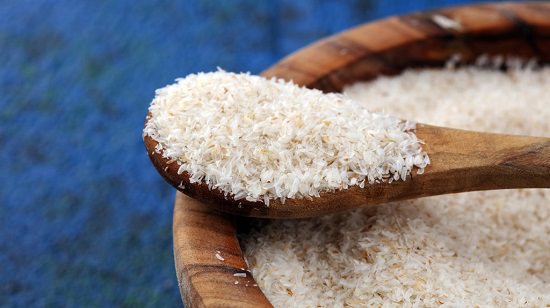Know whether you can use psyllium husk for psoriasis or not and if yes, how to use it. Keep reading to know more about it!
Psoriasis is a chronic, non-contagious immune disorder. The overactive immune system causes skin cell production to speed up; usually, the life cycle of the cells is one month; they grow deep within the skin and rise to the surface of the skin to replace dead cells that are shed.
In psoriasis, cell growth is abnormally rapid, taking only 3-4 days. This overproduction causes cells to pile up on the skin, giving rise to thick red patches and whitish-silver scales- psoriasis plaques. These are generally accompanied by dry, cracked skin that itches and bleeds.
While multiple patches can develop all over the body, the most commonly affected areas are the scalp, navel, forearms, and shins. Scales are frequently found on the joints: knees and elbows. There is no cure for psoriasis; the disorder is cyclical; it flares up for weeks or months and then subsides into intervals of remission.
Possible Causes
There is no clear cause for this immune malfunction, but research suggests a strong genetic link. Psoriasis is not contagious. Individuals, who have an existing predisposition for the disorder, can be disease-free for years but start showing symptoms when exposed to certain triggers.
Common Psoriasis Triggers
1. Psychological Stress
High stress levels can trigger a flare-up of skin lesions, and the flare-ups can cause further stress, thereby creating a vicious cycle.
2. Alcohol
Excessive consumption of alcohol can trigger psoriasis flare ups. Therefore, avoid drinking too much alcohol.
3. Skin Injury
Any trauma that disrupts the skin surface: cut, scrape, sunburn, injection, scratch, or even a bug bite can trigger a psoriasis flare-up. This is popular as the Koebner phenomenon.
4. Medications
Certain medications for malaria, high blood pressure, and lithium can be possible triggers.
5. Weather Conditions
Extremes of humidity or dry, heated indoor air in winters are some of the possible weather conditions that can trigger psoriasis.
6. Illness
While fighting other infections e.g., strep throat or ear infections, the immune system may go into overdrive, triggering a flare-up.
7. Others
Some triggers are unique to the individual, so after diagnosis, carefully track and monitor flare-ups to identify them.
Management of Psoriasis
Psoriasis has no cure. Apart from avoiding triggers, treatment options exist to manage the condition:
1.Topical Medication
You can use creams or ointments to directly apply on the psoriasis patches as your doctor might prescribe. They contain active ingredients like corticosteroids, retinoids, anthralin, salicylic acid, and also vitamin D analogs.
2. Systemic Medication
Medication include steroids, cyclosporine, methotrexate, retinoids, and biologics. However, these medications are often responsible for altering the immune system]
3. Light Therapy
It is often the first line of treatment for severe cases; you can use it in conjunction with medications. Light therapy targets the overactive white blood cells that attack skin cells and also trigger rapid cell growth. Sunlight, Ultra Violet light (UVA and UVB), and Psoralen plus UVA (PUVA) are used.
Psyllium Husk for Psoriasis
The exact cause of psoriasis is still unknown; one school of thought suggests that a digestive malfunction may play a role. If undigested food reaches the small intestine, a phenomenon is known as leaky gut. Bacteria can grow on the food and break through the ordinarily impermeable intestinal lining and get unleashed into the entire system, setting off psoriasis.
Psyllium husk is a soluble fiber that acts as a bulk-forming laxative. It comes from the seeds of the Plantago ovata plant. Apart from alleviating leaky gut syndrome, the psyllium husk promotes a healthy colon, unclogs the intestines, and allows for regular bowel movements.
How to Use
- Take ½-2 teaspoons of psyllium husk. First-time users should start with ½ tsp of Psyllium.
- Mix with 1 cup of warm water
- It quickly forms a gelatinous mass, so drink immediately.
- Wash it down with a glass of regular water.
You can take this mixture on an empty stomach in the morning or before bed. Use Psyllium only after consulting a doctor. If you notice any of the following side effects, immediately discontinue use and seek medical help.
- Rectal bleeding
- Constipation for more than seven days
- Severe stomach ache
- Signs of psyllium allergy: breathing difficulty, itching, skin rashes, swelling around face and throat, or vomiting.
Now that you know how to use psyllium husk for psoriasis, consult your doctor and start using the home remedy to ease the condition.



